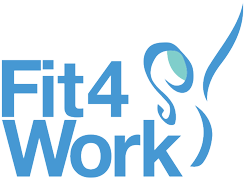DSE Assessments – Regulations or Duty of Care?
Posted on 25 February 2020

Introduction
For some employees, DSE Assessments could seem like unnecessary organisational compliance, further regulations to follow, criteria to meet, and one more consideration in a no-doubt already-packed work schedule.
In actual fact, DSE Assessments are a business process that represent an organisation’s duty of care to their employees, helping to ensure their health, safety, comfort and engagement. Not only experienced DSE Assessors, Fit4Work are now offering DSE Assessor training, to help businesses deploy assessments in-house.
Originally introduced in 1992, to protect workers from the side effects associated with operating a computer workstation, DSE (which stands for Display Screen Equipment) is now utilised in over 50% of job roles.
When you consider that The Health & Safety Executive (HSE) have previously reported that 9.5 million workdays are lost due to work-related musculoskeletal injuries, it’s no surprise that DSE Assessments are a legal requirement, and part of official Health and Safety regulations.
The Dangers of Unsuitable Conditions & Workstation Misuse
Common issues attributed to operating a computer workstation include backache, upper limb pains, aches and pains, repetitive strain, eye strain and fatigue.
While it may seem unlikely that discomfort due to unsuitable workstation conditions or equipment could require medical attention, our Fit4Work Trainers see cases of inflammations due to repetitive typing in an uncomfortable position, and eye strain due to the brightness of monitor screens, on a regular basis.
The root cause of injuries incurred at workstations can be difficult to identify, but by practising DSE Assessment Criteria, organisations can ensure the safest possible working conditions for their employees.
Employers must conduct an assessment when a new workstation is set-up, a change is made to an existing workstation or its utility, a new employee joins the business (and the office), and when/if a worker complains of pain or discomfort.
No matter our role, or salary, nobody wants to sit in pain or discomfort at work, nor should they have to.

The DSE Workstation Checklist
The official governmental DSE checklist touches on all aspects of the common-or-garden workstation.
Keyboards, Mice/Trackballs, Display Screens, Software, Furniture and Environment, are all inspected and considered, regarding their suitability for the tasks they’re being used for, their position, and their likelihood of causing repetitive strain or musculoskeletal injuries.
For example, mice, like telephones, must be positioned in such a way that the employee’s arm can rest without needing to be extended.
Regarding furniture, which must comply with DSE regulations, chairs should be equipped with adjustable leavers allowing the worker to adjust the height, back rest and tilt of the chair. Regulations also specify that if an employee is unable to rest their feet flatly on the ground, then a suitable footrest should be provided.
Similarly, desks should be large enough to house all workstation equipment, whilst leaving enough space to ensure the avoidance of collisions, and navigational difficulties for workers.
A further example of DSE Assessment Criteria, is the requirement that employees working with paper documents should be provided a document holder, situated in the appropriate position, which they recommend to be between the keyboard and the screen, or next to, and at the approximate height of, the monitor screen.
Even light is considered. Not only to improve the lighting over the documents being read, but task lamps are encouraged in DSE regulations to reduce the likelihood of workers leaning into the screen, to avoid the injuries associated with poor posture.
These threats to the health of employees can be avoided or minimised by implementing DSE Assessment quality standards.
Fit4Work Individual DSE Assessments
You see, DSE Assessments really do hold enormous benefits for both employees and employers alike.
For businesses, DSE regulations provide the peace of mind that their employees work in a safe environment, and for employees, the security of working for an organisation that cares about their health, safety, comfort, and happiness. Whilst happy employees are often engaged in, and connected to the businesses they work for, there’s a hidden, bottom-line benefit for organisations.
At Fit4Work, we’ve helped extend the many benefits of DSE Assessments to organisations such as The UK Boarder Agency, BBC, ITV, HM Revenues & Customs, DVLA, British Library, Royal College of Nursing, The Insolvency Service, and Department of Work & Pensions.
We can provide individual assessments for all employees using DSE, which can take up to 30 minutes per person.
For employees with complex medical problems, or those suffering from chronic musculoskeletal issues, we can also provide advanced workstation assessments.
After the assessments, we’ll produce a detailed report outlining our findings, any changes we’ve made, the information given and our recommendations.

What Does an Individual DSE Assessment Entail?
When it comes to our experienced Fit4Work trainers running DSE Assessments within an organisation, we consider the following things:
Fit4Work DSE Assessor Training Course
Fit4Work are pleased to extend our Train the Trainer courses to the world of DSE Assessments.
On our one-day, in-house DSE Assessor Training Course, employees will be provided with the knowledge and skills to confidently carry out workstation risk assessments.
Working only with registered physiotherapists, who’re highly experienced in deploying DSE Assessments, course participants will benefit from our trainers’ real-life knowledge and experience, and will be given the opportunity to discuss relevant issues throughout the day.
What Does a DSE Assessor Training Course Entail?
Aimed predominately at Facilities Managers, Health & Safety Managers, Occupational Health Therapists and staff who’ve been nominated to carry out workstation risk assessments, our DSE Assessor Training Course covers:
Course participants will:

Fit4Work Events
For those nominated to deploy DSE Assessments by their employers, we’re running one-day IOSH Approved DSE Assessor Training Courses in cities around the UK.
Now, Fit4Work can come to you, running in-house training, or we’ll make it easy for you to come us.
Exploring both the theoretical and practical applications of DSE Assessments, these one-day training courses, approved by the Institution of Occupational Safety and Health, contain the same exercises and produce the same outcomes as our DSE Assessor Training Courses, but are held in a convenient venue, local to you.
Deployed by Angela Hinton MCSP HPC, a Chartered Physiotherapist with over 27 years of experience in treating musculoskeletal and work-based injuries, tickets for our public courses are now listed and available to buy online via our website.
Saving organisations the cost of employing external DSE Assessors, helping them remain compliant with DSE regulations and helping to provide a safe environment for all employees, explore our public DSE Assessor Training Courses today.
For more information about any of our DSE Assessment Training Courses, or to get in touch to see how Fit4Work can help your business, contact us today.
Tagged as:




